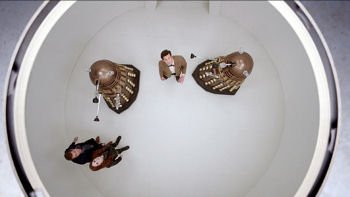People always say Steven Moffat's Doctor Who scripts are confusing, but I never really felt that way until now. I had to watch "Asylum of the Daleks" twice before I was able to understand and (mostly) enjoy it.
Let me see if I have this right: following the events of "Victory of the Daleks," the Daleks are once again a vast race with a parliamentary government, and we see them in a time period when they maintain an asylum planet for reject Daleks. There's a problem with its security system, and they're worried about letting the mentally ill out onto their "streets" (or maybe just about one particular wayward Dalek who's been causing trouble).
So they capture the Doctor, Amy, and Rory with disturbing ease and decide to kill two birds with one stone: send the unhackable trio in to do their dirty work, and only then exterminate them along with the insane Daleks who now appear to be more trouble than they're worth.
Even if that's all correct, there's a lot I still don't understand or didn't catch the answers to. For example, why fog the asylum planet with nanowhatsits that turn humanoids into Dalek puppets, and who pulls their strings? Is it a way of converting any shipwreck survivors into day nurses, or just a convenient way to not only shoehorn in some of Moffat's greatest hits (nanotech, mechanical elements that push out of people's faces, walking corpses that don't know they're dead) but also make Amy and Rory's marriage crisis into less of a non-sequitur?
 What about that marriage crisis, anyway? Has this never come up before, and was the River Song thing just too weird for them to consider her their child?
What about that marriage crisis, anyway? Has this never come up before, and was the River Song thing just too weird for them to consider her their child?
And why is there a human-to-Dalek conversion lab on the asylum planet? Who's doing that work, if all the mentally healthy Daleks are too scared (which is apparently "not Dalek," yet there it is) to go down to the planet? And why is Dalek life (and hatred) so sacred to them now, when in the classic series you'd see a Dalek self-destruct just because someone threw a blanket over its eyestalk?
Well, these are new times, for Daleks and for us, and everything does feel fresher—the storytelling, the direction, Amy's and Rory's hair. Even the title sequence and lettering have been updated: everything looks hazier, softer in focus, ominously fiery at the end. Fans of the classic series who've seen "Logopolis" might be reminded of the atmosphere in the nested TARDISes and start listening for a cloister bell. Fans of the new series who've never seen "Logopolis": what have you been doing with the eight months since the Christmas special?
Maybe you've just been reading spoilers and set reports. I haven't, but unless you've shut out Doctor Who news entirely, you know Jenna-Louise Coleman is the new companion and that she joins the Doctor in the Christmas special. So what the heck is she doing in this?
Does she somehow escape? Does the Doctor pick her up earlier in her timeline (which would fit Moffat's M.O. and include a built-in tragic dilemma, but would also seem to cause all manner of problems with cause and effect)? Will we meet her clone, or her twin? Or will wishful thinking win out and give us a Time Lord from the past who decides, as is her habit, to wear someone else's likeness as easily as copying a dress? It's a fantastic trick to give us the new companion five stories earlier than promised, and hopefully Moffat will give us a satisfying explanation.
 The foreknowledge helped make the twist ending a real surprise, but by the same token made it difficult not to watch Coleman's character with an eye toward "what will she be like as a companion?" rather than "what is this character like?" So rather than accepting Oswin at face value as a person, I kept thinking: "She talks too fast, and her charisma is coming mostly from her looks and the script. What's she going to be like when she can't just crack jokes competently?" I'd hoped for something truly different from the next companion, and unless what happens to her here is a crucial part of her character at Christmas, I'm not sure we can expect that.
The foreknowledge helped make the twist ending a real surprise, but by the same token made it difficult not to watch Coleman's character with an eye toward "what will she be like as a companion?" rather than "what is this character like?" So rather than accepting Oswin at face value as a person, I kept thinking: "She talks too fast, and her charisma is coming mostly from her looks and the script. What's she going to be like when she can't just crack jokes competently?" I'd hoped for something truly different from the next companion, and unless what happens to her here is a crucial part of her character at Christmas, I'm not sure we can expect that.
Karen Gillan and Arthur Darvill are still splendid, even if Amy and Rory are getting so predictable that Moffat has to have them sign divorce papers to pique our interest (and why bother, just to dissolve the problem in the very same story without resolving it?).
Matt Smith is Matt Smith, as always endlessly watchable, though he comes as close to James Bond in this episode as he has since the Pertwee days. I guess you need badass quotes for the trailers, but is this the Doctor who wanted so badly to be thought dead and disappear in "The Wedding of River Song"? How did the Daleks find out so quickly that he was still around, and what's to stop anyone else from doing the same?
Though the ending, with that repeated question, made me cringe a little with the on-the-nose-ness of it, I liked the Doctor effectively disappearing again as a result. His delight at his own anonymity made me wonder if this Doctor's tragic flaw would turn out to be the inverse of the Tenth's: rather than the hubris of the Time Lord Victorious, maybe this Doctor's flaw will be his eager retreat from everyone, his predilection for hiding and dallying in history (dating Earth monarchs and movie stars, playing the triangle in a recording of Carmen).
Okay, but how was this episode? Just fine, the second time. Maybe even better the third time, we'll see. The repeated word "eggs" and the scene where Amy wanders into a room of catatonic Daleks and, due to her nanoconversion, sees them as men and women dressed as extras in The Great Gatsby would have made the whole thing worth it even without that delicious climactic reveal of Oswin's identity.
So fine, Moffat, keep us guessing now until Christmas. You've earned it.

 What about that marriage crisis, anyway? Has this never come up before, and was the River Song thing just too weird for them to consider her their child?
What about that marriage crisis, anyway? Has this never come up before, and was the River Song thing just too weird for them to consider her their child?
 The foreknowledge helped make the twist ending a real surprise, but by the same token made it difficult not to watch Coleman's character with an eye toward "what will she be like as a companion?" rather than "what is this character like?" So rather than accepting Oswin at face value as a person, I kept thinking: "She talks too fast, and her charisma is coming mostly from her looks and the script. What's she going to be like when she can't just crack jokes competently?" I'd hoped for something truly different from the next companion, and unless what happens to her here is a crucial part of her character at Christmas, I'm not sure we can expect that.
The foreknowledge helped make the twist ending a real surprise, but by the same token made it difficult not to watch Coleman's character with an eye toward "what will she be like as a companion?" rather than "what is this character like?" So rather than accepting Oswin at face value as a person, I kept thinking: "She talks too fast, and her charisma is coming mostly from her looks and the script. What's she going to be like when she can't just crack jokes competently?" I'd hoped for something truly different from the next companion, and unless what happens to her here is a crucial part of her character at Christmas, I'm not sure we can expect that.




